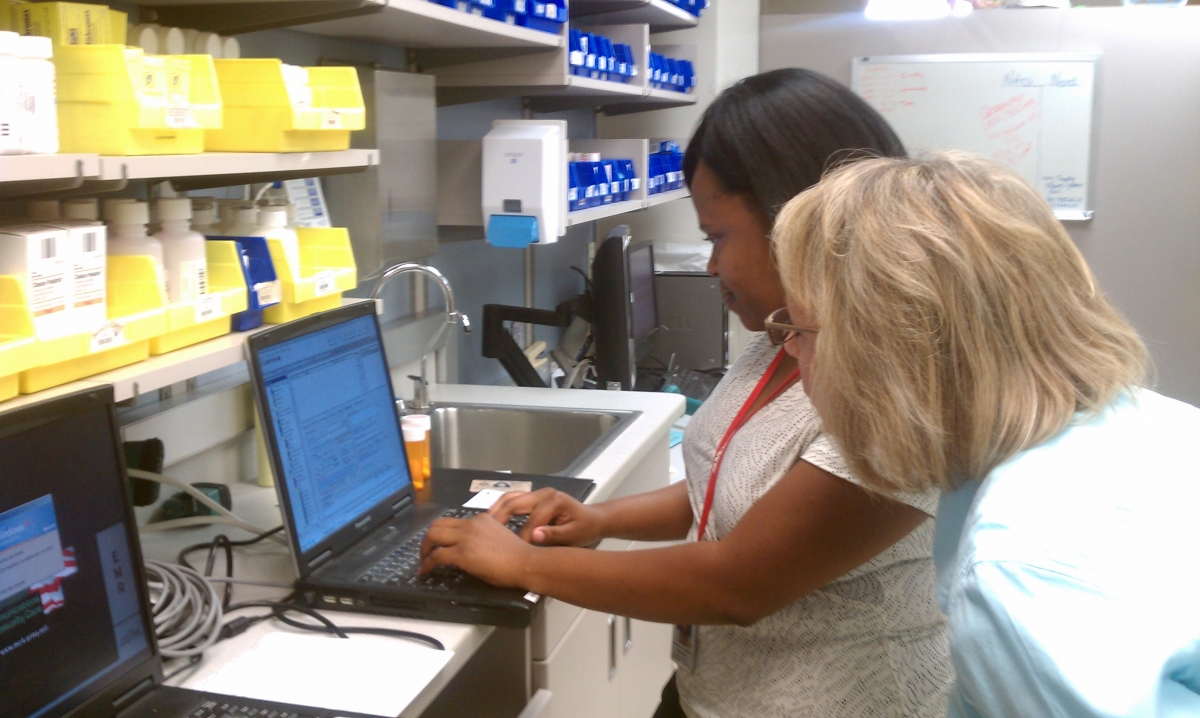EAHP Members call for universal use of electronic prescribing for Europe
26th February 2015

Ahead of its annual Congress in Hamburg, which is focused on the topic of patient safety, the European Association of Hospital Pharmacists (EAHP) has published a policy statement from its membership that calls for universal application of electronic prescribing across Europe in order to deliver a step change in medication error prevention.
The statement also highlights the need for full take up of electronic patient health records and reemphasises the value of bedside scanning practices to reduce medication error at the point of administration in hospitals.
Dr Roberto Frontini, President of the European Association of Hospital Pharmacists, said: "New technology, and the burst of innovation it releases for finding new solutions to old problems, is an exciting process to witness. Europe's hospital pharmacists embrace the possibilities technology offers for service improvement and better patient care. For example, electronic prescribing can eliminate so many of the problems associated with handwritten prescriptions, dramatically improve record keeping and offer a range of opportunities for enhancing prescribing practice. It must be a target to have such technology in place in all European healthcare systems.
However, as the EU institutions and national governments reflect on their role in delivering the promises of eHealth and mHealth, they must understand that the challenges of integrating new technology into healthcare are not new. Since the 1980s Europe's hospital pharmacists have been highlighting the patient safety benefits of identifying medicines via a bar code to the single primary package unit, to facilitate for example, a bedside scan of the medicine immediately prior to its administration to the patient in hospitals. Yet for over 30 years that potential boon for reducing medication error remains unrealised as agreement by the pharmaceutical industry to change bar coding practices has not been achieved.
There's a lesson in this. Talking about the potential benefits of new technology for healthcare delivery is not enough. Coordinated plans for implementation are required, involving all stakeholders, and potentially applied at pan-national levels."
The new EAHP policy statement also provides a message of caution about 'rogue' or unregulated mHealth applications, that have not received appropriate oversight in their construction and could have potential negative impacts by offering contradictory, inaccurate or low quality advise to patients and healthcare professionals. Areas where this could become a significant concern include dosing calculators or dosing advice. EAHP highlight a need for a level of regulatory oversight with such applications, potentially through kitemark or national approval schemes.
The implementation of new technological innovations within health systems should also be conducted with healthcare professional training needs significantly in scope.
The statement closes with a call for hospital pharmacists to always be involved in the design, specification of parameters and evaluation of ICT within the medicines processes of hospitals.
The full EAHP policy statement on eHealth and mHealth is available here.
ENDS
For further information contact info[at]eahp[dot]eu 00 322 741 2436
NOTES TO EDITORS:
1. The European Association of Hospital Pharmacists (EAHP) is an association of national organisations across 34 countries representing hospital pharmacists at European and international levels. More information about the EAHP and its history here.
2. The EAHP annual Congress is the second largest hospital pharmacy education event in the world, attended by over 3,000 professionals from across the globe. The 20th Congress takes place in Hamburg from 25th-27th March and has as its theme: "The hospital pharmacist's agenda: patient safety first". More information here.
3. The full EAHP policy statement on eHealth and mHealth is available here. It was agreed via a unanimous vote of EAHP's member associations at the 2014 EAHP General Assembly in Sofia, Bulgaria.
4. Electronic prescribing or e-prescribing is the computer-based electronic generation, transmission and filling of a medical prescription, taking the place of paper and faxed prescriptions. Electronic prescribing helps to reduce the incidence of medication errors and improves communication between healthcare professionals about medicines. It also supports clinical activity by interacting with knowledge sources and providing decision support at the point of prescribing or administration.
5. Since the 1980s the European Association of Hospital Pharmacists has promoted the need for medicines to contain a bar code to the single unit of the primary package in order to facilitate the achievement of bedside scanning practices. A scan of a medicine immediately prior to its administration to the patient can play a major role in preventing medication error by enabling a final check that the medicine is indeed the right medicine, for the right patient time, being given at the right time, by the right route of administration, and in the right dose. Indeed, preliminary studies have suggested the use of bar codes on medicines up to the single unit can help to reduce medication error rates by 41.4%. (Poon EG et al. Effect of Bar-Code Technology on the Safety of Medication Administration. N Eng J Med 2010;362:1698-707). More information here. EAHP statement from 1987 here.
6. In its response to a 2014 European Commission consultation on mHealth EAHP outlined some concerns relating to the potential adverse impacts for patient safety from poorly developed health apps, especially where these relate to medicines use. More information here.
7. In May 2014, EAHP hosted a summit of its member country associations, alongside European patient and healthcare professional organisations, to agree robust statements on the future of hospital pharmacy. Amongst the agreed statements was a clear call for hospital pharmacist involvement in ICT development in hospitals that concern medicines processes:
STATEMENT 1.7: "Hospital pharmacists must be involved in the design, specification of parameters and evaluation of ICT within the medicines processes. This will ensure that pharmacy services are integrated within the general Information and Communication Technology (ICT) framework of the hospital including electronic health (eHealth) and mobile health (mHealth) procedures." More information here.
8. Requests for interviews with Dr Roberto Frontini can be made by contacting info[at]eahp[dot]eu 00 322 741 2436




